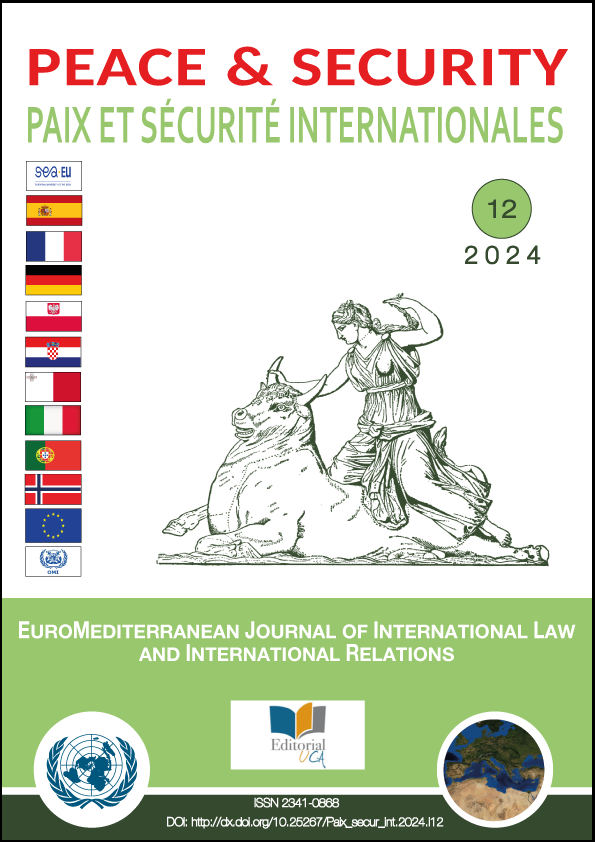Análisis y tipificación del Sistema Internacional Contemporáneo. Una aproximación desde el realismo estructural y las teorías de sistemas
Homenaje al Profesor Liñan Nogueras

DOI
https://doi.org/10.25267/Paix_secur_int.2024.i12.1801Información
Resumen
Este trabajo analiza la evolución del sistema internacional desde el final de la Guerra Fría. El objetivo perseguido es averiguar si se ha producido un cambio desde un sistema westfaliano a otro de carácter jerárquico. Para ello, en primer lugar, abordaremos la cuestión de qué es un sistema internacional y cuáles son sus elementos desde el realismo estructural de Waltz. Por tanto, nos centraremos en la estructura del sistema como elemento definitorio del mismo y especialmente en la relación anarquía frente a jerarquía y la distribución de las capacidades como elementos de evolución de nuestro sistema. En segundo lugar, usaremos los tipos de sistemas de acción establecidos por Kaplan para entender cómo se operan los cambios en los sistemas internacionales y cuáles pueden ser las configuraciones posibles y determinar su correspondencia con los diferentes momentos del sistema internacional contemporáneo.
Palabras clave
Descargas
Cómo citar
Licencia
Derechos de autor 2024 PEACE & SECURITY-PAIX ET SÉCURITÉ INTERNATIONALES (EuroMediterranean Journal of International Law and International Relations)

Esta obra está bajo una licencia internacional Creative Commons Atribución-NoComercial 4.0.
Copyright
Es condición para la publicación que el autor o autores ceda(n) a la Revista, en exclusiva, los derechos de reproducción. Paix et Sécurité Internationales es una revista que proporciona un acceso abierto inmediato a su contenido totalmente gratuito para lectores como para los investigadores que pretendan publicar en ella, ya que no se realizan cobros por concepto de envío, procesamiento ni publicación. Los usuarios podrán leer, descargar, copiar, distribuir, imprimir, buscar o enlazar el texto completo de los artículos publicados, o utilizarlos para cualquier otro propósito, dentro de la legalidad vigente. Y podrán hacerlo sin coste alguno, y sin necesitad de solicitar permiso al editor a al autor. Todo ello de acuerdo con la definición de acceso abierto de la Iniciativa Acceso Abierto de Budapest.
Citas
ALLISON, G. “The Myth of the Liberal Order: From Historical Accident to Conventional Wisdom”, Foreign Affairs, vol. 97, núm. 4, 2018.
ARON, R. Paz y guerra entre las naciones, Alianza, Madrid, 1985.
BARBÉ, E. “La crisis del orden internacional liberal y su impacto en las normas internacionales”, en: Las normas internacionales ante la crisis del orden liberal, Tecnos, 2021.
BROOKS, S. “Can we identify a benevolent hegemon?”, Cambridge Review of International Affairs, vol. 25, núm. 1, 2012.
BUZAN, B. “From International System to International Society: Structural Realism and Regime Theory Meet the English School”, International Organization, vol. 47, núm. 3, 1993.
CARDINALE, M. “Seguridad Internacional y derechos humanos: una reflexión a partir de los aportes del cosmopolitismo crítico y el liberalismo ofensivo”, Revista de Estudios en Seguridad Internacional, vol. 3, núm. 1, 2017.
CHAN, S. “Challenging the liberal order: the US hegemon as a revisionist power”, International Affairs, vol. 97, núm. 5, 2021.
GARCÍA SEGURA, C. “Westfalia, Worldfalia, Eastfalia. El impacto de las transformaciones de la estructura de poder interestatal en el orden internacional”, Revista Española de Derecho Internacional, vol. 69, núm. 2, 2017.
GILMORE, J. “Protecting the Other: Considering the process and practice of cosmopolitanism” European Journal of International Relations, vol. 20, núm. 3, 2014.
HELLQUIST, E. y PALESTINI, S. “Regional sanctions and the struggle for democracy: Introduction to the special issue”, International Political Science Review, vol. 42, núm., 4, 2021.
HOPEWELL, K. “When the Hegemon Goes Rogue: Leadership Amid the US Assault on the Liberal Trading Order”, International Affairs, vol. 97, núm. 4, 2021.
HURD, I., “Breaking and making norms: American revisionism and crises of legitimacy”, International Politics, vol. 44, núm. 2–3, 2007.
IKENBERRY, J. “Getting Hegemony Right”, The National Interest, vol. 63, 2001.
IKENBERRY, J. “The Future of the Liberal World Order: Internationalism After America”, Foreign Affairs, vol. 90, núm. 3, 2011.
JAMES E. DOUGHERTY, J. y PFALTZGRAFF, R. Teorías en pugna de las relaciones internacionales, Grupo Editor Latinoamericano, Buenos Aires, 1993.
KAPLAN, M. System and Process in International Politics, Science Editions, New York, 1962.
KISSINGER, H. Orden mundial. Editorial Debate, Barcelona, 2016.
MARRERO ROCHA, I. “A vueltas con el Estado en el análisis de las relaciones internacionales”, en Un mundo en continua mutación: desafíos desde el Derecho internacional y el Derecho de la UE: Liber Amicorum Lucía Millán Moro, Arazandi, 2022.
MEARSHEIMER, J. The Tragedy of Great Power Politics, WW Norton, New York, 2001.
MEARSHEIMER, J. “Bound to Fail: The Rise and Fall of the Liberal International Order”, International Security, vol. 43, núm. 4, 2019.
MILLER, B. “Democracy promotion: Offensive liberalism versus the rest (of IR theory)”, Millennium, vol. 38, núm. 3, 2010.
NYE, J. “Soft power: the origins and political progress of a concept”, PALGRAVE COMMUNICATIONS 3 (17008), 2018.
PAUL, T. “Globalization, deglobalization and reglobalization: adapting liberal international order”, International Affairs, vol. 97, núm. 5, 2021.
PAUL, T. y RIPSMAN, N. “Globalization and the National Security State” International Studies Review, vol. 7, núm. 2, 2010.
Ripsman, N. “Globalization, deglobalization and Great Power politics”, International Affairs, vol. 97, núm 5, September 2021, pp. 1317–1333.
ROSECRANCE, R. “Bipolarity, multipolarity, and the future”, Journal of Conflict Resolution, vol. 10, núm. 3, 1966.
SAKWA, R. “BRICS and Sovereign Internationalism”, Strategic Analysis, vol. 43, núm. 6, 2019.
SAKWA, R. “The International System and Models of Global Order”, Russia in Global Affairs, vol. 17, núm. 3, 2019.
SÁNCHEZ ORTEGA, A. “El orden liberal ante el equilibrio de poder y la redefinición de la legitimidad”, Revista Electrónica de Estudios Internacionales, vol. 43, 2022.
SHEEHAN, M. The Balance of Power: History & Theory. Routledge, 1996.
STRANGE, S. States and Markets. Bloomsbury, 2015.
TALIAFERRO, J. “Security under anarchy: Defensive Realism revisited”, International Security, vol. 25, núm. 3, 2001.
WALTZ, K. Theory of International Politics, McGraw-Hill, New York, 1979.
WATSON, A. The evolution of international society: a comparative historical analysis, Routledge, New York, 1992.






